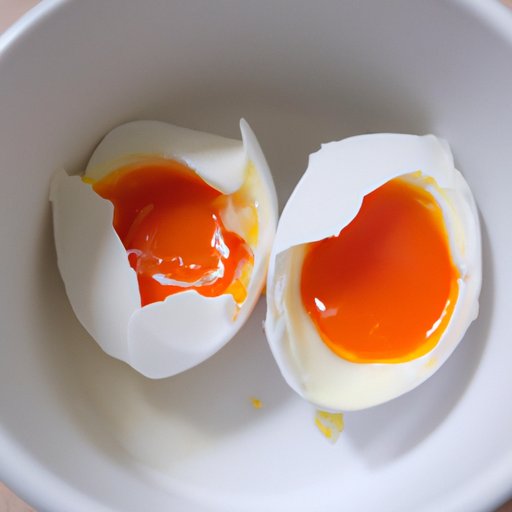
Introduction
Boiling an egg may seem like a simple task, but in reality, there are many factors that can affect the outcome. How long should you boil it for? How can you tell if it’s done? And what can you do to avoid the dreaded green ring around the yolk?
In this article, we’ll cover everything you need to know about boiling an egg perfectly. We’ll provide you with a step-by-step guide, share a colorful infographic, and provide an accompanying video tutorial to ensure you never have to struggle with boiled eggs again. Additionally, we’ll share cooking tips, creative recipe ideas, and answer common questions you may have.
Step-by-Step Guide
Begin by filling a pot with enough water to fully submerge your eggs. Place the pot on the stove and bring the water to a gentle boil. Lower the eggs into the water using a slotted spoon or tongs, being careful not to crack them.
If you prefer your eggs soft-boiled, cook for anywhere from 4-6 minutes, depending on how runny you like the yolk. For a medium boil, cook for around 7-8 minutes, and for a hard-boiled egg, cook for 10-12 minutes. Once your desired cook time has passed, remove the eggs from the boiling water and place them immediately into a bowl of ice water. This will prevent further cooking and make the eggs easier to peel.
Infographic
Check out our colorful infographic below for a visual guide to boiling an egg.
Video Tutorial
Watch our video tutorial below for a more in-depth demonstration of how to boil an egg to perfection.
Additional tips and tricks:
- Add a teaspoon of vinegar to the water to help prevent the egg whites from spreading if the shell cracks.
- Use eggs that are a few days old, as they will be easier to peel than extremely fresh eggs.
- Start with room temperature eggs to avoid cracking when placing them in the hot water.
Cooking Tips
Knowing when your eggs are finished boiling can often be tricky. Try the methods below to determine your eggs’ doneness.
- Spin: Spin the egg and see if it wobbles – if it does, it’s still runny. If it doesn’t, it’s fully cooked.
- Shine: Hold a flashlight up to the egg to see if there’s any movement on the inside. If it’s stationary, it’s done.
- Color: Cut the egg open – if the yolk is yellow, it’s done. If it’s green, it’s overcooked.
After boiling, it’s important to properly store your eggs. Leave the shell intact until you’re ready to eat them, and store in the refrigerator for up to a week.
Recipe Collection
Boiled eggs can be used in a variety of recipes, such as egg salad, deviled eggs, and more. Check out the recipes below for some creative ideas!
- Avocado and Egg Stuffed Sweet Potatoes
- Curried Egg Salad Sandwich
- Kimchi and Egg Fried Rice
- Salmon and Egg Salad
FAQ
Q: Why do my eggs crack when I boil them?
A: Your eggs may be cracking due to a rapid change in temperature. Allow them to come to room temperature before boiling, and avoid shocking them by placing them in cold water when they’re done cooking.
Q: How can I prevent the green ring from forming on the yolk?
A: The green ring occurs when overcooking causes a reaction between the sulfur and iron in the egg. To prevent this, only cook the eggs for the recommended amount of time and place them immediately in ice water to halt the cooking process. Also, try using older eggs, as fresher eggs will have a lower pH and are more likely to develop the ring.
Conclusion
Boiling an egg perfectly can be a challenge, but with the right tools and techniques, you can achieve a delicious result. Remember to use our step-by-step guide, check out our visual infographic, and watch our accompanying video tutorial for a full understanding of the cooking process. Whether you enjoy your eggs soft-boiled or hard-boiled, we hope these tips and tricks will help take your egg game to the next level.




